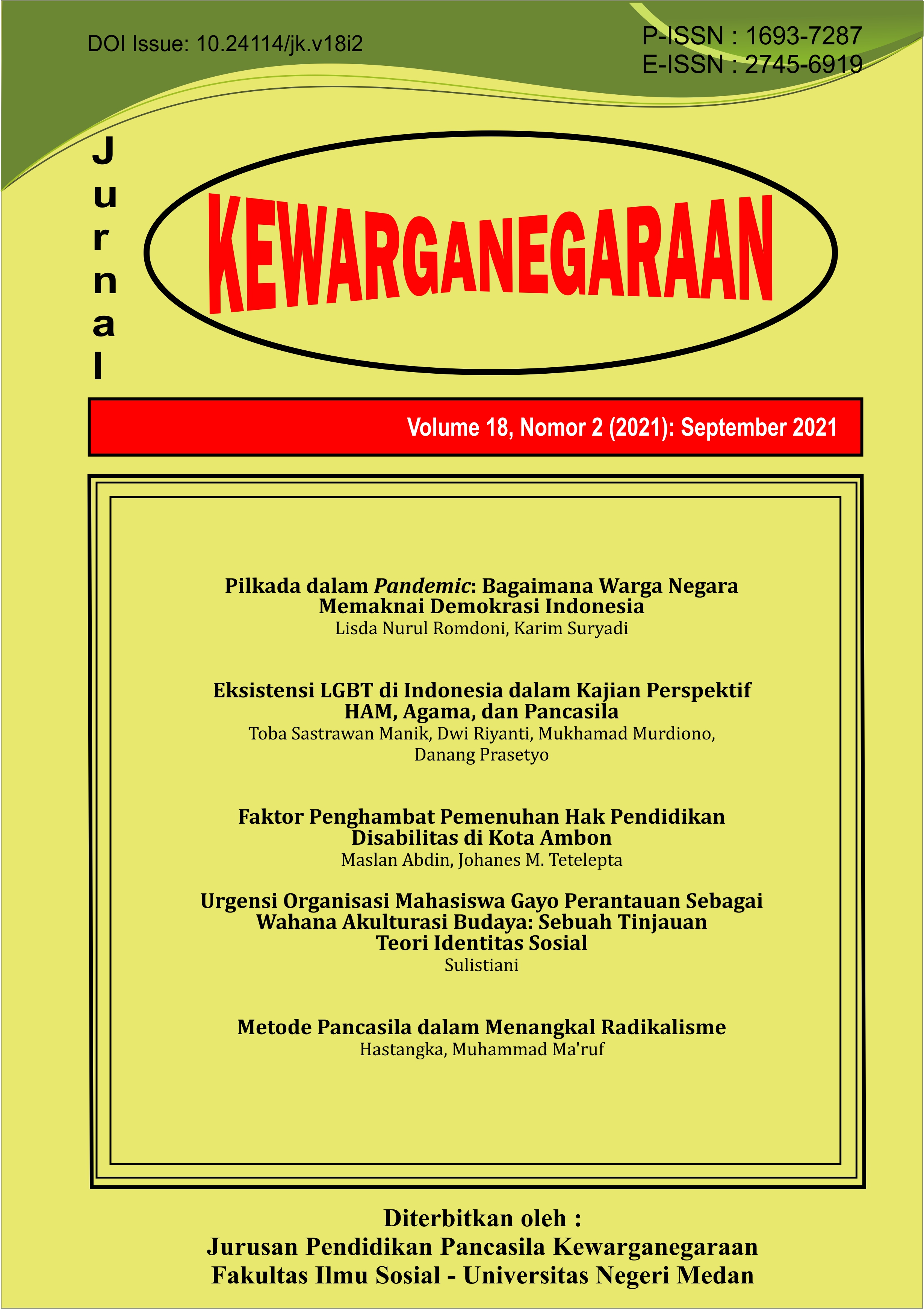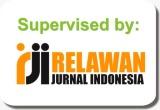Urgensi Organisasi Mahasiswa Gayo Perantauan Sebagai Wahana Akulturasi Budaya: Sebuah Tinjauan Teori Identitas Sosial
DOI:
https://doi.org/10.24114/jk.v18i2.27287Keywords:
nomads, gayo ethnic, cultural acculturation, social identity, perantau, etnik gayo, akulturasi budaya, identitas sosialAbstract
AbstractMigrating is defined as a person's journey to another area to achieve the desired goal and stay, In the realm of education, many youths decide to go to other areas to get a good education and under expectations for the next life. The sophistication of today's technology makes migrating not a complicated thing to be doing in the community, especially the youth in taking education in place of choice. Based on the phenomena that occur to the lives of teenagers to study, the formulation of the research problem is planned, how students are social relations with the people of Jogja while in overseas land within the scope of the organization, this aims to find the strategy of student organizations of social life in Jogja. The research method is qualitative with a descriptive approach, data sources are Gayo students who are active in ethnic-based student organization activities in Jogja, data collection techniques are interview, observation, and documentation methods. The research results show that ethnic-based student organizations, IMAGAYO and IPEMAHLUTYO, carry out various activities such as the Saman and Guel dance as a form of interaction with the people of Jogja and adapt themselves by following the habits, behaviour patterns and Javanese culture as the majority culture in Jogja.-------AbstrakMerantau diartikan sebagai perjalanan seseorang ke daerah lain guna mencapai tujuan yang diinginkan dan menetap sementara, dalam ranah pendidikan banyak pemuda yang memutuskan untuk pergi ke daerah lain guna mendapatkan pendidikan yang baik dan sesuai dengan harapan untuk kehidupan selanjutnya. Kecanggihan teknologi saat ini menjadikan merantau bukan hal yang rumit untuk dilakukan oleh masyarakat khususnya kaum pemuda dalam menempuh pendidikan di tempat-tempat pilihan. Berdasarkan fenomena yang terjadi dalam kehidupan para remaja untuk menempuh studi, maka disusun rumusan masalah penelitian yaitu bagaimana hubungan sosial mahasiswa dengan masyarakat Jogja selama berada di tanah rantau dalam lingkup organisasi, hal ini bertujuan untuk menemukan strategi organisasi mahasiswa dalam kehidupan sosial di Jogja. Metode penelitian yaitu kualitatif dengan pendekatan deskriptif, sumber data adalah para mahasiswa Gayo yang aktif dalam kegiatan organisasi kemahasiswaan berbasis etnik di Jogja, teknik pengumpulan data yaitu metode wawancara, observasi, dan dokumentasi. Secara keseluruhan hasil penelitian menunjukkan bahwa organisasi mahasiswa berbasis etnik yaitu IMAGAYO dan IPEMAHLUTYO melakukan berbagai kegiatan seperti tari Saman dan Guel sebagai salah satu bentuk interaksi terhadap masyarakat Jogja dan menyesuaikan diri dengan cara mengikuti kebiasaan, pola tingkah laku dan budaya Jawa sebagai budaya mayoritas di Jogja.References
Bahry, R., Wanti, I. D., Lestari, T., Syai, A., & Djuaeni, I. (2014). Saman: Kesenian dari Tanah Gayo. Jakarta: Pusat Penelitian dan Pengembangan Kebudayaan Badan Penelitian dan Pengembangan, Kementerian Pendidikan dan Kebudayaan.
Carr, D. (2021). Personal Identity is Social Identity. Phenomenology and the Cognitive Sciences, 20(2), 341“351. https://doi.org/10.1007/s11097-020-09702-1
Creswell, J. W. (2016). Research Design Pendekatan Metode Kualitatif, Kuantitatif, dan Campuran (A. Fawaid & R. K. Pancasari, Penerj.). Yogyakarta: Pustaka Pelajar.
Davis, K., & Newstrom, J. w. (1985). Human Behavior at Work Organizational Behavior (6 ed.; A. Dharma, Penerj.). Jakarta: Erlangga.
Dockery, A. M. (2012). Do Traditional Culture and Identity Promote the Wellbeing of Indigenous Australians? Evidence from the 2008 NATSISS. In B. Hunter & N. Biddle (Ed.), Survey analysis for Indigenous policy in Australia: Social science perspectives (Vol. 32, hal. 281“305). Canberra: ANU E Press.
Fujiantari, D., & Rachmatan, R. (2016). Perbedaan Kecerdasan Emosional Pada Mahasiswa Yang Aktif dan Tidak Aktif dalam Organisasi Kemahasiswaan. Jurnal Psikohumanika, 8(2), 43“60.
Gitosudarmo, I., & Sudita, I. N. (2014). Perilaku Keorganisasian. Yogyakarta: BPFE.
Hamzah, I. F., Agoha, C., & Silviani, A. (2019). Membangun Identitas Sosial dalam Organisasi Mahasiswa Pascasarjana. Psycho Idea, 17(1), 32“41. https://doi.org/10.30595/PSYCHOIDEA.V17I1.4030
Harwood, J. (2020). Social Identity Theory. In The International Encyclopedia of Media Psychology (hal. 1“7). https://doi.org/10.1002/9781119011071.IEMP0153
Haslam, S. A., Haslam, C., Jetten, J., Cruwys, T., & Dingle, G. A. (2020). Social Identity. The Wiley Encyclopedia of Health Psychology, 679“688. https://doi.org/10.1002/9781119057840.CH119
Heniwaty, Y. (2015). Tari Saman Pada Masyarakat Aceh Identitas dan Aktualisasi. Universitas Negeri Medan.
Liebkind, K., Mähönen, T. A., Varjonen, S., & Jasinskaja-Lahti, I. (2016). Acculturation and Identity. In D. L. Sam & J. W. Berry (Ed.), The Cambridge Handbook of Acculturation Psychology (2 ed., hal. 30“49). https://doi.org/10.1017/CBO9781316219218
Miller, C. R. (2004). Ethnic Organizations and the Maintenance of Tradition. In D. Stanley (Ed.), Folklore in Utah: A History and Guide to Resources (hal. 216“223). Colorado: University Press of Colorado; Utah State University Press.
Muhtadi, A. S. (2016). Perspektif Perubahan Sosial. Bandung: Pustaka Setia.
Nuraeni, H. G., & Alfan, M. (2012). Studi Budaya di Indonesia. Bandung: Pustaka Setia.
Samovar, L. A., Porter, R. E., & McDaniel, E. R. (2010). Komunikasi Lintas Budaya; Communication Between Cultures. Jakarta: Salemba Humanika.
SD, H. A. (2015). Analisa Diplomasi Budaya Indonesia Melalui Tari Saman Gayo Dalam Mengukuhkan Identitas Nasional Bangsa. Jurnal Hubungan Internasional, 4(1), 88“96. https://doi.org/10.18196/hi.2015.0069.88-96
Setiawan, I. M. B., Agung, I., Yufridawati, & Irmawati, A. (2017). Akulturasi Kebudayaan pada Masyarakat di Wilayah 3T: Peran PKBM terhadap Perubahan Sosial Budaya Masyarakat. Jakarta: Pusat Penelitian Kebijakan Pendidikan dan Kebudayaan, Balitbang, Kemendikbud.
Setiyawati, Y. (2019). Regulasi Diri Mahasiswa Ditinjau Dari Keikutsertaan Dalam Suatu Organisasi. Empati-Jurnal Bimbingan dan Konseling, 6(1), 71“78. https://doi.org/10.26877/EMPATI.V6I1.4115
Sholichah, I. F. (2016). Identitas Sosial Mahasiswa Perantau Etnis Madura. Jurnal Psikosains, 11(1), 40“52. https://doi.org/10.30587/PSIKOSAINS.V11I1.635
Sudirmanto, S. (2019). Perilaku Mahasiswa Rantau di Pekanbaru (Studi Kasus Mahasiswa Pelalawan). Jom Fisip, 6(11), 1“12.
Suwardani, N. P. (2020). œQuo Vadis Pendidikan Karakter dalam Merajut Harapan Bangsa Yang Bermartabat (I. W. Wahyudi, Ed.). Denpasar: UNHI Press.
Thaumaet, Y. A., & Soebijantoro, S. (2019). Akulturasi Budaya Mahasiswa Dalam Pergaulan Sosial di Kampus (Studi Pada Mahasiswa Program Studi Pendidikan Sejarah Universitas PGRI Madiun). AGASTYA: JURNAL SEJARAH DAN PEMBELAJARANNYA, 9(1), 113“124. https://doi.org/10.25273/AJSP.V9I1.3641
Vu, C. M., Nguyen, D., Tanh, D. B., & Chun, J. (2016). Case Study of an Ethnic Community-Based Organization in the United States. Nonprofit and Voluntary Sector Quarterly, 46(1), 199“217. https://doi.org/10.1177/0899764016654220
Downloads
Published
Issue
Section
License
Copyright (c) 2021 Sulistiani Sulistiani

This work is licensed under a Creative Commons Attribution-ShareAlike 4.0 International License.
Authors published with the Jurnal Kewarganegaraan agree to the following terms:
- Authors retain copyright and grant the journal the right of first publication with the work simultaneously licensed under a Creative Commons Attribution License (CC BY-SA 4.0) that allows others to share the work with an acknowledgment of the work's authorship and initial publication in this journal.
- Authors are able to enter into separate, additional contractual arrangements for the non-exclusive distribution of the journal's published version of the work (e.g., post it to an institutional repository or publish it in a book), with an acknowledgment of its initial publication in this journal.
- Authors are permitted and encouraged to post their work online (e.g., in institutional repositories or on their website) prior to and during the submission process, as it can lead to productive exchanges, as well as earlier and greater citation of published work. (See The Effect of Open Access)
Licence

Jurnal Kewarganegaraan is licensed under a Creative Commons Attribution-ShareAlike 4.0 International License.








